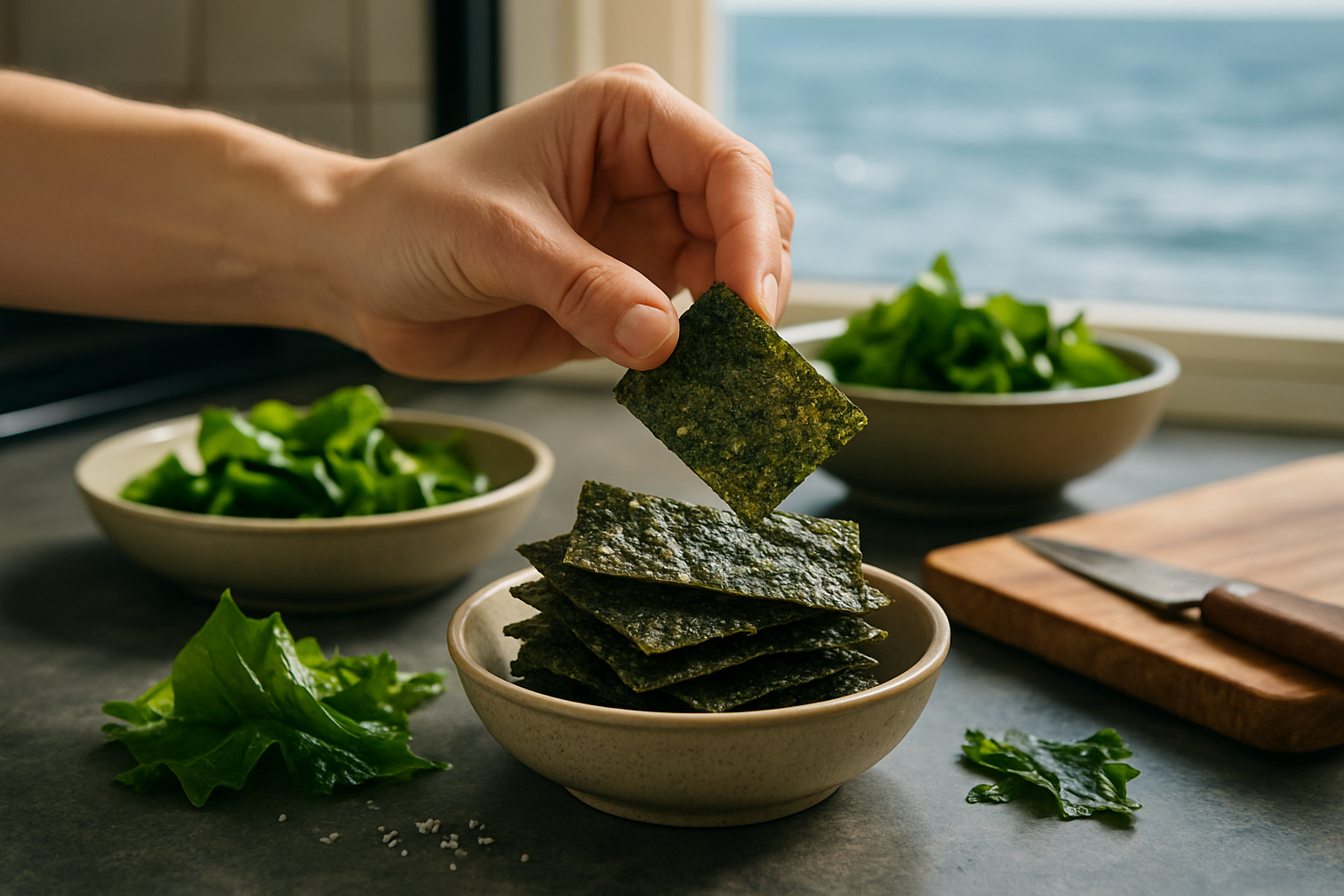Seaweed Snacks: The Ocean's Green Gold
Dive into the world of seaweed snacks, where briny flavors meet nutritional powerhouses. These marine morsels are making waves in the culinary scene, offering a unique taste of the sea while packing a punch of vitamins and minerals. From crispy nori sheets to umami-rich kelp jerky, seaweed snacks are redefining the way we think about healthy indulgence. Join us as we explore the diverse and delicious world of these oceanic treats.

A Sea of Flavors
The world of seaweed snacks is vast and varied, offering a wide array of textures and tastes to suit every palate. Nori, the type of seaweed most commonly used in sushi rolls, takes center stage in many snack varieties. Roasted and seasoned nori sheets provide a delicate, crispy texture that melts in your mouth, often enhanced with flavors like wasabi, teriyaki, or sea salt. For those seeking a heartier bite, there’s kelp jerky, which offers a chewy texture reminiscent of traditional beef jerky but with a distinct oceanic twist. Dulse, a red seaweed with a naturally smoky flavor, is often dried and eaten as is or ground into flakes to add depth to various dishes. Wakame, known for its subtle sweetness, is frequently used in salads but has also found its way into crispy chip form. The diversity of seaweed varieties ensures that there’s a snack option to please every taste bud, from the mildly curious to the most adventurous eaters.
Nutritional Treasures from the Deep
Seaweed snacks are not just a treat for the taste buds; they’re also a nutritional powerhouse. These marine plants are rich in essential minerals, particularly iodine, which is crucial for thyroid function and often lacking in many diets. They also contain high levels of vitamins A, C, and E, as well as B vitamins, making them an excellent choice for boosting overall health. The fiber content in seaweed aids digestion and promotes feelings of fullness, which can be beneficial for weight management. Additionally, seaweed is a rare plant-based source of omega-3 fatty acids, typically found in fish, making it an excellent option for vegetarians and vegans looking to incorporate these essential fats into their diets. With their low calorie count and high nutrient density, seaweed snacks offer a way to indulge in a salty craving without compromising on health goals.
Sustainability from Shore to Shelf
One of the most compelling aspects of seaweed snacks is their sustainability. Seaweed cultivation requires no freshwater, fertilizers, or arable land, making it one of the most environmentally friendly food sources available. As concerns about climate change and food security grow, seaweed farming presents a promising solution. It not only provides a nutritious food source but also helps to sequester carbon and reduce ocean acidification. Many seaweed farms also create habitats for marine life, contributing to biodiversity in coastal areas. The minimal processing required to turn seaweed into snacks further reduces their environmental impact. As consumers become more eco-conscious, the sustainability factor of seaweed snacks adds to their appeal, making them a choice that’s good for both personal health and planetary well-being.
Culinary Creativity with Seaweed Snacks
While delicious on their own, seaweed snacks also open up a world of culinary possibilities. Creative chefs and home cooks alike are finding innovative ways to incorporate these oceanic treats into a variety of dishes. Crumbled nori sheets can add a savory crunch to salads or serve as a unique breadcrumb alternative for coating fish or chicken. Kelp jerky can be diced and used as a flavor-packed addition to stir-fries or grain bowls. Dulse flakes make an excellent seasoning for popcorn or roasted vegetables, imparting a subtle smoky flavor. Seaweed snacks can also be incorporated into homemade energy bars or trail mixes for a nutrient boost on the go. As the popularity of seaweed snacks grows, we can expect to see even more creative applications in both professional kitchens and home cooking, further cementing their place in the culinary landscape.
Seaweed Snack Savvy
- Seaweed is one of the few plant-based sources of vitamin B12, making it valuable for vegetarian and vegan diets.
- Some seaweed varieties contain more calcium by weight than milk.
- Nori sheets used for sushi rolls and snacks are made from a red algae species, despite their green appearance.
- Seaweed farming can grow up to 30 times faster than land-based vegetables.
- The global seaweed market is projected to reach $9.1 billion by 2024, driven in part by the popularity of seaweed snacks.
- Seaweed snacks can be a great source of umami flavor without added MSG.
- Some seaweed species can absorb carbon up to 50 times faster than tropical forests.
Embracing the Seaweed Snack Revolution
As we navigate the ever-evolving landscape of health-conscious eating, seaweed snacks stand out as a beacon of innovation and sustainability. These oceanic delights offer a unique combination of flavor, nutrition, and environmental responsibility that’s hard to match. Whether you’re a seasoned seaweed enthusiast or a curious newcomer, there’s never been a better time to explore the diverse world of seaweed snacks. By embracing these marine morsels, we not only treat our taste buds to new experiences but also contribute to a more sustainable food future. So next time you’re reaching for a snack, consider diving into the green gold of the sea – your body and the planet will thank you.






